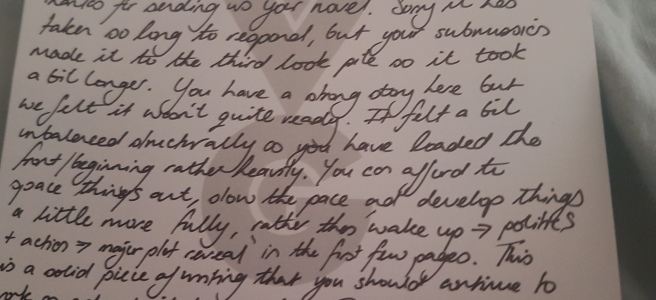First of all, I’d like to say one thing very loud and clear: you do not need an MFA to be successful as a writer. There are so many successful writers who never studied anything more than the books that came before theirs. I did it because I wanted to (needed to?) be more guided in my learning.
The idea germinated when I submitted to one of Gollancz’s ‘open windows’ where you could send your manuscript to them without an agent. Having tried and failed to get an agent by that point, I submitted an epic fantasy novel. It did quite well, and got through three rounds of sifting to the final round, but was ultimately unsuccessful. After a year (that’s how long it took for them to get through all the thousands of manuscripts they received), they sent me a postcard with a very nice note and some feedback on why they ultimately decided it was not for them. In short, I had a problem with pacing: there was too much going on in the opening chapters. This was my first feedback on a novel from a publisher and it took over a year to get it (if you don’t count all the times I submitted work that was rejected without feedback), so I decided that it might be a good idea to get some advice on my writing from experienced, published writers.
After a bit of shopping around, I came across the Manchester Writing School at Manchester Metropolitan University. The prospectus looked promising and, better still, their MFA was available as an online course. I could do it part-time and continue to work full-time, which was essential in my case.
The first two years on the part-time course went to the MA. Each year’s classes consisted of a module on reading and a module workshopping our own writing in groups led by a tutor. There was also an elective module (I chose scriptwriting). Each of these ended in a written assignment (for the reading, an essay, for the writing a critique and essay combined and for the scriptwriting, a 30 minute script).
The reading lists were interesting, involved some great writers, and spanned the decades from post world war 2 to almost present day. We looked at each novel in depth, with regard to structure, technique, stylistic choices, use of language, etc. What made them work? What made them stand out?

In the workshopping modules I was fortunate enough to be placed with an excellent group of writers, some of whom became firm friends. My tutors for both modules were great, and they guided rather than taught, which was exactly what I needed. I learned how to put what I learned in the reading modules to good use in reading my classmates’ writing closely and critically, which in turn helped me to see my own writing in a more critical light. And the feedback from my peers and the tutor often told me that the niggle I’d ignored was something I should actually work on.
At the end of the MA we submitted a dissertation, which consisted of the first chapters of the novel we workshopped, or in a friend’s case, several stories from the collection she was writing (which is brilliant, and I would love to one day be promoting it on here!).
For the MFA year, we had a module on ‘The Industry’ which was a series of talks from visiting professionals from across the publishing industry, including an independent publisher, an editor from a ‘big five’ publisher, an agent, a cover artist, a representative from the Arts Council (among others). All these talks were extremely useful in showing us the different avenues for our writing, as well as how to best prepare for the submission process.
Of course, we also had to finish the novel we workshopped in the first two years, which was probably the most difficult part for me but mostly for personal reasons. I was going through a difficult time health-wise, and as I recovered from that I lost my mum. The university was very understanding and I was able to request not one but two extensions and finish up several months late. I did finish, though.

So, ‘Get to the point, Cheryl.’ I hear you say. Was it worth it?
Overall, I think mostly yes. For the improvement in my writing from the new skills and techniques I learnt, and my ability to be more critical with my own writing, most definitely yes. For the people I met while studying, a resounding yes. Tutors and fellow students alike were all lovely. I’d heard horror stories (not about Manchester) of students being reduced to tears after having their work torn apart by the tutor, or their class. This was definitely not the case at Manchester, where I always felt supported. That’s not to say there was no criticism, but there’s a helpful way and a destructive way and Manchester taught the helpful way.
The online format wasn’t ideal at the beginning (text chat mostly) but easy to adapt to, and proved useful in that I could keep a copy of the chat to look back at what had been discussed (as it sometimes flew by too fast for me to read). But it lacked something. If I hadn’t been already used to online chat (I met my husband in an IRC chatroom in 2000), I might have found it more of a challenge. Don’t get me wrong, we did okay and still managed to become friends without meeting in person right away, but it was a struggle sometimes. Enter the pandemic midway through year two and all classes switched to video chat across the university and that was so much better. It would have been nicer to have that at the start.
I’m not any closer to publication, but that’s not the university’s fault. I was quite burned out by the end of it – even part-time, it was a struggle to keep up while working full time in an often mentally exhausting job and dealing with the aforementioned personal issues. So I took some time off afterwards and it grew increasingly difficult to get back into the habit. Recently, I’ve begun tinkering with the novel I wrote for the degree again. The markers gave me some very specific feedback on where I could improve, and I also came up with a plot thread that brings the story firmly into the here and now of social media influence in our lives. This addition may add enough to make it a more attractive length to publishers as it was slightly under the norm before. We shall see.
The degree may have been useful for a career in the publishing industry had I not been well on my way towards 60 years old by the time I finished. There aren’t many openings for someone my age at entry level, and those jobs don’t pay as well as what I’m doing now. I also thought about going into teaching creative writing, but I’d need a PhD these days and would be ready to retire by the time I was done with that. But that’s all down to me, really.
I should have done it sooner (the story of my life).
In the next blog(s), I want to go review some of the craft books I read while studying. Some were recommended by tutors, some were ones I found through research, but there were some really useful ones that I like to refer back to now and then.


interrsting thanks. The cancer puts me off cos any sort of deadline has become iffy otherwise I think I’d be tempted to try it too.
I hear you Terry. It was breast cancer treatment that made me late in finishing. Then my mum. Life intervenes. They were good at giving me extensions, even offered to let me take time out altogether. I hope you are doing okay at the minute? x
my 3rd book is due May for ebook June for paper so far so good. I had kidney cancer 2011 but a brain tumour 2020= which did cause more problems but still writing and doing Milford next month
Glad to hear you are still writing and publishing after all that. I keep saying I’m going to do Milford one of these years but something always gets in the way (usually money haha).